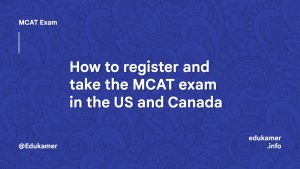What exams are required to study in Canada? Are you considering applying to a college or university in Canada? It’s important to be aware of the standardized exams that are necessary to gain admission. Canada boasts outstanding educational institutions that are often more affordable than those in the United States. As an international student, it’s crucial to understand the tests that are required for admission.
So what exams do you need to take to study in Canada?
To put it simply, entrance exams in Canada can be classified into two types: academic tests and language tests. Language tests assess the English language proficiency of students, while academic tests evaluate a student’s knowledge in various subject areas. Below is a list of the exams that are typically required to study in Canada.
The exams required to study in Canada vary depending on the level of education and the institution you are applying to. Generally, international students must meet the language proficiency requirements and academic standards set by their chosen institution. Here are some common exams required for international students:
- Language Proficiency Exams: Students whose first language is not English or French may be required to take an English proficiency test such as the TOEFL, IELTS, or CAEL or French proficiency tests such as TEF or TCF.
- Academic exams: For undergraduate studies, students will need to provide their high school transcripts and proof of graduation. For graduate studies, students will need to provide their undergraduate transcripts, and may also need to take standardized tests such as the GRE or GMAT depending on their program.
- Other exams: Some professional programs such as law or medicine may require additional exams such as the LSAT or MCAT.
It is important to check with the specific institution and program you are applying to for their exact requirements.
Language Proficiency Exams in Canada
Canada has two official languages: English and French. International students who do not speak English or French as their first language may need to take language proficiency exams to demonstrate their language skills. Here are the language proficiency exams commonly accepted by Canadian educational institutions:
- English Language Proficiency Exams:
- TOEFL (Test of English as a Foreign Language)
- IELTS (International English Language Testing System)
- CAEL (Canadian Academic English Language)
- French Language Proficiency Exams:
- TEF (Test d’évaluation de français)
- TCF (Test de connaissance du français)
It is important to note that some universities or colleges may only accept specific language proficiency exams. It’s best to check with the institution you are applying to for their specific language proficiency requirements.
Academic exams in Canada
If you are looking to study in Canada as an international student, you may be required to provide proof of your academic qualifications through a standardized exam. The specific exam requirements can vary depending on the institution and program you are applying to, but here are some commonly accepted exams:
- TOEFL or IELTS: International students whose first language is not English will need to demonstrate English proficiency through one of these exams. TOEFL and IELTS measure your ability to read, write, speak, and understand English at a college or university level.
- SAT or ACT: These exams are commonly used to assess the academic abilities of students seeking admission to undergraduate programs. The SAT is more common in Canada, but some institutions may also accept the ACT.
- GRE or GMAT: Graduate programs may require applicants to take either the GRE (Graduate Record Examination) or the GMAT (Graduate Management Admission Test). These exams are used to assess a student’s readiness for graduate-level study in their chosen field.
- MCAT: Students who wish to study medicine or health sciences may need to take the MCAT (Medical College Admission Test) to demonstrate their readiness for medical school.
It is important to note that not all institutions or programs require these exams, and some may have additional requirements or alternatives to these exams. It is always a good idea to research the specific requirements of the institutions and programs you are interested in to ensure you are meeting all of their requirements.




